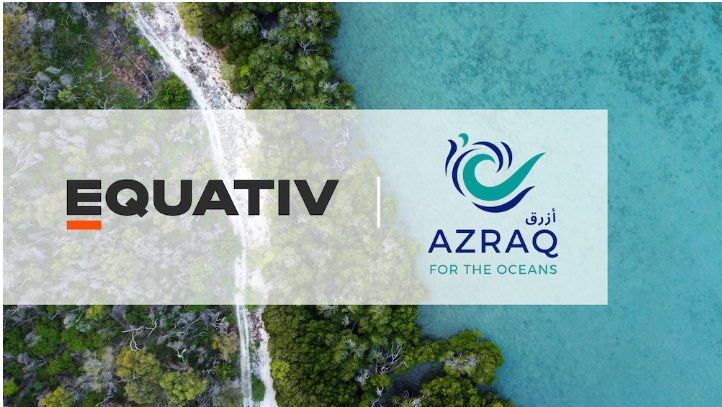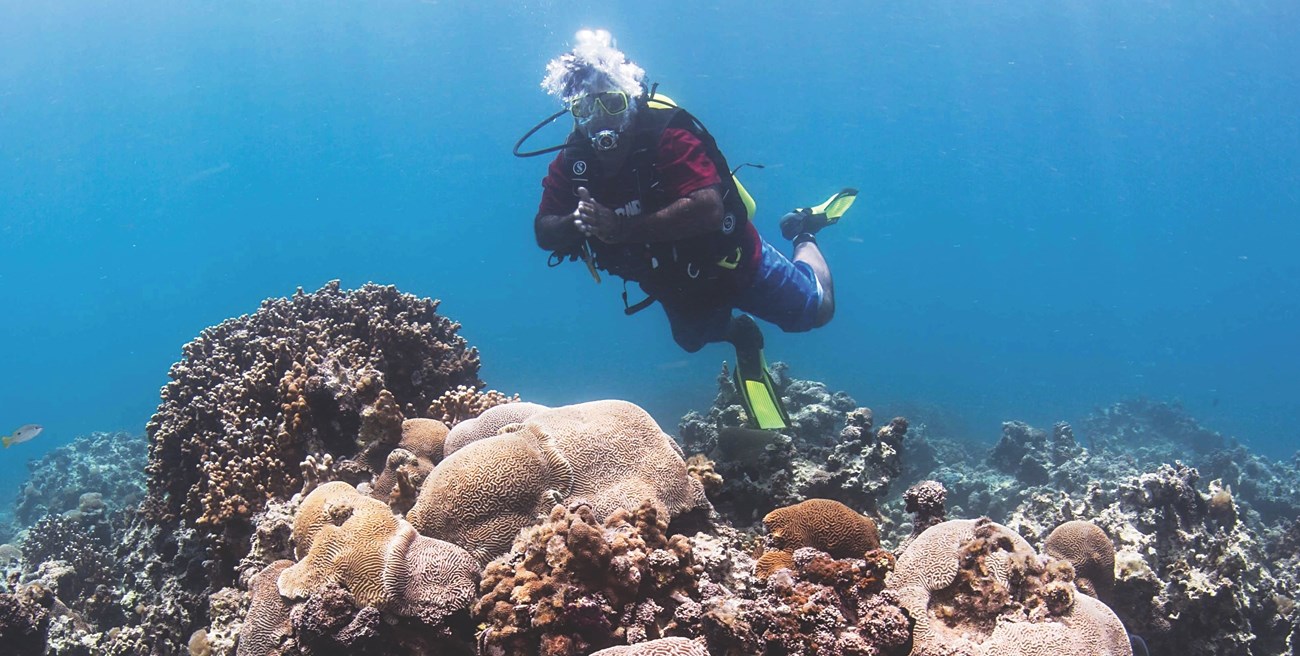
Equativ partners with Azarq to develop sustainable ad campaigns
The partnership aims to develop sustainable ad campaigns by supporting tangible and meaningful actions in the UAE. Equativ, an independent ad tech firm, has joined


The UAE has directed significant investments towards initiatives aimed at safeguarding its seas and preserving marine biodiversity, according to environmentalists, who stressed the urgent need for collective action to defend the world’s oceans against critical threats, such as plastic pollution and CO2 emissions.
Pressing Threats Facing Our Oceans
According to Hala Dahmane, President & Managing Director of Azraq, a non-profit marine conservation organisation in the UAE, anthropogenic CO2 emissions stand out as one of the gravest threats to ocean health.
“Since the industrial revolution, human activities have significantly increased greenhouse gas emissions, with CO2 levels rising from around 278 parts per million (ppm) pre-industrial to over 421 ppm by early 2023.
This surge in CO2 is a major driver of the ocean’s heat content, responsible for about 90% of Earth’s excess thermal energy from global warming between 1971 and 2018. “For regions like the Arabian Gulf, the world’s warmest sea, further temperature increases could drastically impact marine life. Elevated sea temperatures threaten the delicate balance of marine ecosystems, risking the survival of native species and promoting the spread of invasive species,” Dahmane told Aletihad in a recent interview.
Dahmane added that ocean alterations induced by climate change could jeopardise the UAE’s desalination processes, potentially compromising the quality and availability of seawater used in this process. Fisheries, integral to the livelihoods of local communities, are also at risk, according to Dahmane.
“Addressing these challenges requires urgent, coordinated action to mitigate CO2 emissions and protect our marine environments,” she said.
Paula Jacobson, a People, Culture & Impact Consultant and ocean campaigner, identifies ignorance and apathy as the most pressing threats to oceans today. Many individuals, she notes, remain oblivious to the ocean’s significance. This lack of awareness extends to critical issues such as deep-sea mining and wastewater disposal, which have a detrimental impact on marine ecosystems, she told Aletihad.
Rethinking Plastic
Tatiana Antonelli Abella, Founder of Goumbook, a social enterprise promoting sustainability and green practices in the UAE, highlighted the dire consequences of plastic pollution on marine ecosystems and the planet.
She also noted that recent reports revealed that microplastics have been found in unborn babies and human blood. Goumbook launched the “Drop It – Rethink Plastic” initiative in 2016, which aims to galvanise individuals and the local business community to rethink single-use plastic consumption towards reducing waste creation.
“Long-term sustainable change requires behavioral change. Goumbook believes raising awareness and educating communities fosters a sense of environmental stewardship and buy-in that empowers an active, responsible society locally as well as globally,” Abella told Aletihad.
Jacobson views that expanding protected marine areas and implementing legislative measures, can mitigate plastic and waste dumping, contributing to the broader goal of ocean conservation. Dahmane noted that “businesses across the supply chain have immense power to drive change. By uniting efforts, they can help create a plastic-free future, protecting marine life and ecosystems from the harmful impacts of plastic pollution”.
Brand owners and retailers must reduce reliance on virgin plastic, innovate for highly recyclable materials, and achieve 100% collection rates, even in regions without producer responsibility regulations. Meanwhile, manufacturers and converters should eliminate unnecessary plastics, promote reuse, and develop sustainable delivery models, she said.
Redesigning products for recyclability and prioritising recycled content are crucial, as is reducing plastic demand through elimination, reuse, and innovative models in waste management. Enhancing collection efforts, securing reliable feedstock for recycling, and promoting source separation through incentives are also vital measures, according to Dahmane. She added that expanding and upgrading recycling infrastructure, coupled with technological advancements to increase efficiency, can significantly reduce plastic pollution in waterways.
UAE: Leading the Way
“The UAE is driven by significant investments and forward-thinking initiatives to preserve its ocean and protect marine biodiversity,” Dahmane said. She noted that the country is home to numerous marine research institutions, through which it conducts comprehensive studies on climate change and human impact on marine ecosystems to inform effective conservation policies.
Notably, the UAE has banned single-use plastic bags and upgraded wastewater treatment infrastructure to mitigate pollution and ensure water quality. It has also implemented regulations to manage fish stocks and prevent overexploitation, ensuring sustainable fishing, according to Dahmane.
“Over 10% of the country’s marine waters are designated as Marine Protected Areas, providing safe havens for diverse marine life. Additionally, the UAE has launched projects to restore mangrove ecosystems and conduct coastal clean-up activities.
“At Azraq, we contribute to these national efforts with our mangrove restoration and marine debris clean-up initiatives. We also work with ‘Coralife’ on artificial coral reef projects to enhance marine biodiversity and create new habitats for marine species,” she said.
Jacobson said that the UAE enjoys a growing community of ocean lovers like herself. Jacobson started her own business in 2022, aiming to drive businesses to implement environmental and social impact initiatives and policies. Her collaborative efforts with fellow activists, including surfers, divers, and academics, led to the establishment of the “Ocean Collective”, with plans to unite the ocean community in the UAE.
A Multi-Faceted Approach
Mitigating the impacts of climate change on our ocean requires both immediate and long-term strategies, said Dahmane. “Reducing greenhouse gas emissions is crucial. Transitioning to renewable energy, enhancing energy efficiency, and adopting sustainable practices across industries can significantly cut carbon emissions, tackling climate change at its source rather than just dealing with its consequences”.
Protecting and restoring marine ecosystems also plays a vital role, as healthy mangroves, seagrasses, and coral reefs act as natural carbon sinks, Dahmane added.
“In the UAE, we at Azraq are conducting mangrove restoration and artificial coral reef projects, which not only sequester carbon but also support marine biodiversity and protect coastal areas from rising sea levels”. The environmentalist further highlighted the importance of awareness raising to foster a culture of marine stewardship.
Abella views that “a drastic, global and lasting reduction of CO2 emissions is the most critical step to mitigate the impacts of climate change on our oceans”. The UAE’s initiatives to increase renewable energy usage and its ambitious national mangrove planting targets are steps in the right direction.
Behavioral change regarding human consumption patterns and activities producing CO2 emissions are fundamental, requiring support from all sectors of society.
She noted that Goumbook is providing a platform to mobilise action for our oceans through the MENA Oceans Initiative, which aims to bring regional ocean priorities to the forefront through collaboration with key partners.
Collaboration is Key
Dahmane identified collaboration as the linchpin of effective ocean conservation; while governments enact policies, enforce regulations, and provide resources, communities and individuals drive grassroots initiatives.
She highlighted as an example measure implemented by the UAE to combat marine pollution, such as banning single-use plastic bags and enhancing wastewater treatment infrastructure. “Additionally, regulations have been put in place to manage the fishing industry and prevent overexploitation of fish stocks, reflecting the country’s dedication to sustainable practices and the protection of marine biodiversity”.
Jacobson noted the importance of education and advocacy when it comes to fulfilling individual responsibility to our oceans. “Educate yourself and your children. Be around ocean lovers and develop your compassion for marine wildlife,” she said.
Abella believes that individuals and communities carry a responsibility to self-educate and raise awareness to ensure the preservation of our planet for future generations.
“Look at your consumption habits, understand your carbon footprint and ways to reduce it, for example by minimising single-use plastic and monitoring your water usage. Be mindful of marine wildlife and their habitats, treat natural areas carefully and with respect, eat responsibly sourced seafood, and avoid purchasing items that exploit sea life, such as coral jewelry, tortoiseshell accessories, or shark products”.
Although the collective impact of individual behavior can be “transformational”, the private sector also plays a crucial role in advancing ocean conservation, said Abella. “Businesses of all industries and sizes are uniquely positioned in terms of providing innovative solutions to the marketplace and advocating for policy that will drive large-scale change.
They also carry a corporate responsibility to identify ways and instruments to reduce the environmental and social impact of their operations and educate their employees and stakeholders about it”.
World Oceans Day
This year, World Oceans Day was observed on Saturday under the theme “Awaken New Depths”. The annual occasion aims to raise awareness about the critical role oceans play in our lives and mobilise global action towards their preservation for future generations.
“The ocean sustains and enhances all life on Earth. But our ocean is in trouble. And we only have ourselves to blame. Climate change is triggering rising seas and threatening the very existence of small island developing states and coastal populations.
“Record sea temperatures are sparking extreme weather events that affect us all,” said UN Secretary-General António Guterres in his message on World Oceans Day.
He highlighted the destructive impact of ocean acidification on coral reefs, disrupting food chains and endangering tourism and local economies. Marin ecosystems around the world also face threats posed by unsustainable coastal development, overfishing, deep-sea mining, pollution, and plastic waste, he said, noting that “glimmers of hope” remain.
Share:

The partnership aims to develop sustainable ad campaigns by supporting tangible and meaningful actions in the UAE. Equativ, an independent ad tech firm, has joined

Reed Smith is proud to support sustainability in the UAE through its pro bono partnership with AZRAQ, a marine conservation non-profit. By providing legal expertise

Hala Dahmane is the president and managing director of Azraq ME, a non-profit organisation based in the UAE. The company is dedicated to educating and
(MENAFN– Atteline) Dubai, UAE – Azraq, the UAE-based marine conservation organisation, has announced a significant milestone in its mission to protect marine life, welcoming 352

‘I’ve been running barefoot for 10 years. It feels more natural to me,’ said the 36-year-old resident On the sun-baked roads from Hatta to the

36 year old completes his run from Hatta to Dubai’s Mushrif Park in 17 hours. Dubai: Aakash Nambiar, an Indian expat and ultra-marathoner based in
Fill Out The Form And Our Team Will Get Back To You In 24 Hours.